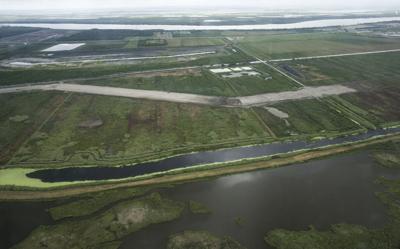We were happy to see Gov. Jeff Landry appoint a new director for the state's Coastal Protection and Restoration Authority last week.
Michael Hare comes to the state's frontline coastal agency from the private sector. He replaces Glenn Ledet, who last month was tapped by Landry to take over the Louisiana Department of Transportation and Development.
Hare's qualifications for the job are extensive. He has an MBA from LSU and a master's degree in foreign policy from American University, and he has spent most of his career working in coastal and environmental policy and consulting.
Hare takes over an agency tasked with perhaps Louisiana's most urgent and vexing challenge. Over the last century, the state has lost roughly 2,000 square miles of land, equivalent to the state of Delaware. Storms are increasingly intense, and the state's land is sinking even as sea levels rise.
At the same time, he must find a way to accomplish the goals laid out in the state's 50-year, $50 billion Coastal Master Plan, the blueprint through which the state works to combat the effects of coastal land loss. The chief issue there will be the way forward on the Mid-Barataria Sediment Diversion, an ambitious and expensive first-of-its-kind project that would divert water from the Mississippi River into the Barataria Basin.
The $3 billion project, which took years to plan and get permitted, has ballooned in cost compared to original estimates and has been opposed from the start by local fishers and oystermen in Plaquemines Parish, where it is located. The project, which broke ground in 2023, is on indefinite pause while officials figure out what comes next.
Beyond that, there are dozens of projects under CPRA's purview, ranging from marsh building to creating jetties and dredging.
In addition, the agency faces an uncertain financial future, with money from the fines and settlements related to the 2010 BP oil spill set to expire in 2031. That revenue forms a big share of CPRA's 2026 budget, and officials have yet to identify a way to replace it when it expires.
But it's not all bad news. The One Big Beautiful Bill, passed earlier this month and signed into law by President Donald Trump, upped the state's share of money collected from oil and gas drilling off the state's coast. The state could now receive an extra $50 million per year for the next decade in funds dedicated to coastal protection and restoration.
Landry hailed Hare's "years of experience in coastal restoration." His appointment also won positive comments from the Coalition to Restore Coastal Louisiana, an environmental group, which praised his "reputation for busting through red tape and working with communities to get things done."
That's high praise, and we certainly hope Hare is able to live up to his promise. He's got a big and important job. We wish him well in it.

